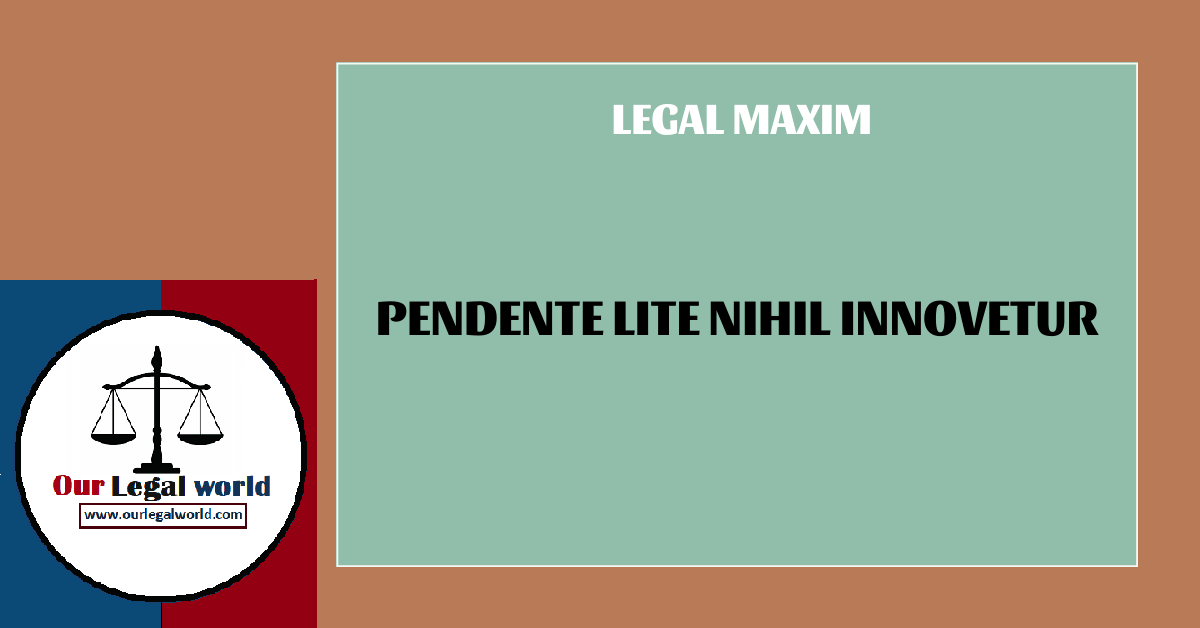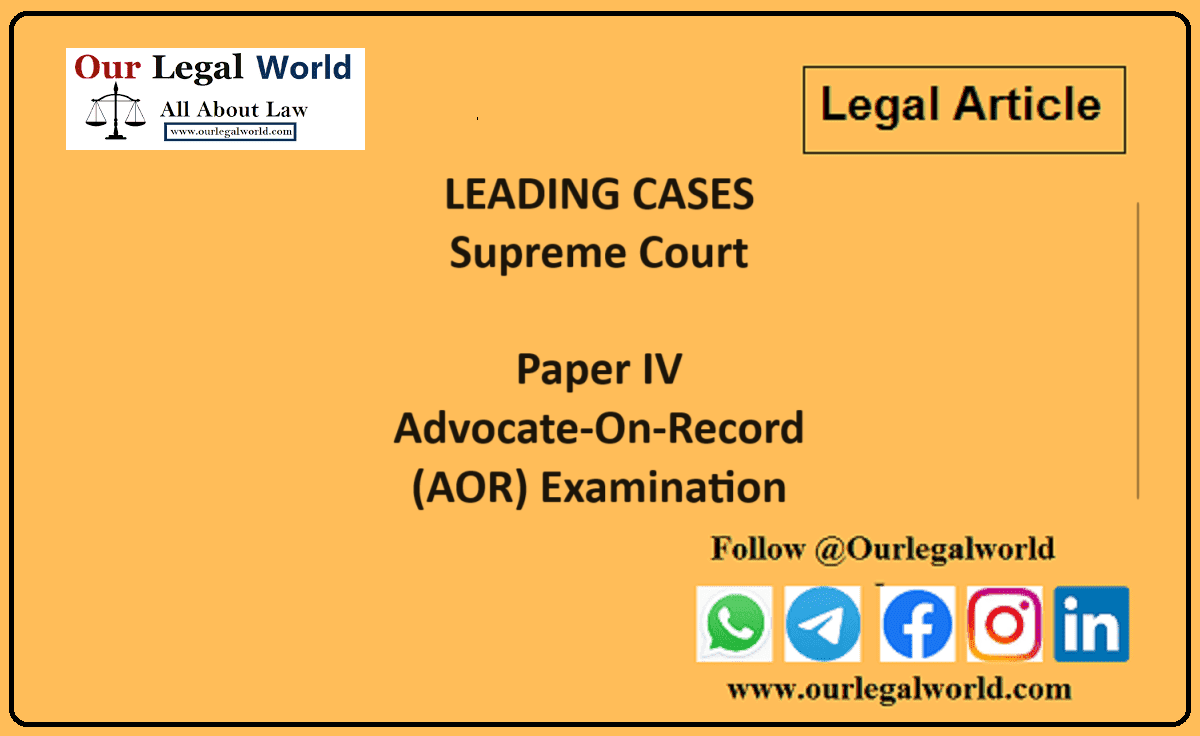PENDENTE LITE NIHIL INNOVETUR
Literal Meaning of the Legal Maxim
Nothing Should be Changed throughout the Pendency of an action
Origin
Latin
Explanation
Doctrine of lis pendens is predicated on legal maxim ‘lite pendente nihil innovetur’ which means during Legal Proceedings Nothing New should be Introduced. This doctrine stood embodied in Section 52 of the Transfer of Property Act 1882. The principle of ‘lis pendens’ is in accordance with the equity, good conscience or justice because they rest upon an equitable and just foundation that it will not be possible to bring an action or suit to a successful termination if alienations are permitted to prevail. A ‘transferee pendente lite’ is bound by the decree as much as he was a party to the suit. A litigating part is exempted from taking notice of a title Non Heritable throughout the pendency of the legal proceedings. However, it should be clear that mere pendency of a suit does not prevent one of the parties from dealing with the property constituting the subject matter of the suit. The law hypothesize a condition that the alienation will not in any manner affect the rights of the other party under any decree which may be passed in the suit unless the property was alienated with the permission of the Court. The transferee cannot deprive the successful plaintiff of the fruits of the decree even though he has purchased the property pendente lite.
The principle that embodies the doctrine is that the subject matter of a suit should not be transferred to a third party during the pendency of the suit. In case of transfer of such immovable property, the transferee becomes bound by the result of the suit. The doctrine of ‘Lis Pendens‘ essentially aims at (i) avoiding endless litigation, (ii) protecting either party to the litigation against the act of the other, (iii) avoiding abuse of legal process.
Illustration
One party 1 sued the Other Party 2 for compensation for the loss incurred. While the case was going on the party 2 transferred his possession to other person and therefore the Party claimed that this transfer was wrong as a result to the Doctrine of Lis Pendens Legal Maxim “pendente lite nihil innovetur”.
Case Laws
- Rajendra Singh and Ors. V/s. Santa Singh And Ors. AIR 1973 SC 2537
In this Case the Court Observed that : The doctrine of lis pendens was intended to strike at the attempts by parties to a legal proceedings to bypass the jurisdiction of a Court, within which a dispute on interests in immovable property is pending, by private dealings which may remove the subject matter of litigation from the ambit of the court’s power to decide a pending dispute or frustrate its decree. Alienees acquiring any immovable property throughout litigation, are held to be bound by an application of the doctrine, by the decree passed in the suit even though they may not have been impleaded in it. The whole object of the doctrine of lis pendens is to subject parties to the litigation as well as others, who seek to acquire rights in immovable property, which are the subject matter of litigation, to the power and jurisdiction of the Court so as to prevent the object of a pending action from being defeated.
- T.G Ashok Kumar V/s. Govindammal and Anr. December 08, 2010
In this Case the Court Observed that : If during the pendency of any suit in a court of competent jurisdiction that isn’t conveying, within which any right of an immovable property is directly and specifically in question, such property cannot be transferred by any party to the suit thus on have an affect on the rights of any other party to the suit under any decree that may be made in such suit. If the title of the pendente lite transferor is upheld regarding the transferred property, the transferee’s title will not be affected. On the other hand, if the title of the pendente lite transferor is recognized solely in regard to a part of the transferred property, then the transferee’s title will be saved only in regard to that extent and the transfer in regard to the remaining portion of the transferred property to which the transferor is found not entitled, will be invalid and the transferee will not get any right, title or interest in that portion. If the property transferred pendente lite, is allotted in entirely to some other party or parties or if the transferor is held to have no right or title in that property, the transferee will not have any title to the property. Where a co-owner alienates a property or a portion of a property representing to be the absolute owner, equities can no doubt be adjusted while making the division during the final decree proceedings, if feasible and practical (that is without causing loss or hardship or inconvenience to other parties) by allotting the property or portion of the property transferred pendente lite, to the share of the transferor, so that the bonafide transferee’s right and title are saved fully or partially.
- Hardev Singh V/s. Gurmail Singh Civil Appeal No. 6222 of 2000
In this Case the Court Observed that : Section 52 of the Act does not declare a pendente lite transfer by a party to the suit as void or illegal, but only makes the pendente lite purchaser bound by the decision of the pending litigation. Thus, if during the pendency of any suit in a court of competent jurisdiction which is not collusive, in which any right of an immovable property is directly and specifically in question, such immovable property cannot be transferred by any party to the suit so as to affect the rights of any other party to the suit under any decree that may be made in such suit.
Reference
- https://indiankanoon.org/doc/177594361/
- https://www.legalworldindia.com/2019/11/doctrine-of-lis-pendens.html
EDITED BY- ANKITA ROY
Also Read: Intellectual Property Law- Nature and Scope







![Tax Law Internship at Legum Attorney [Chamber of Ashish Panday], Delhi : Apply by 15th May 2025](https://www.ourlegalworld.com/wp-content/uploads/2025/05/IMG_0113-min.png)

